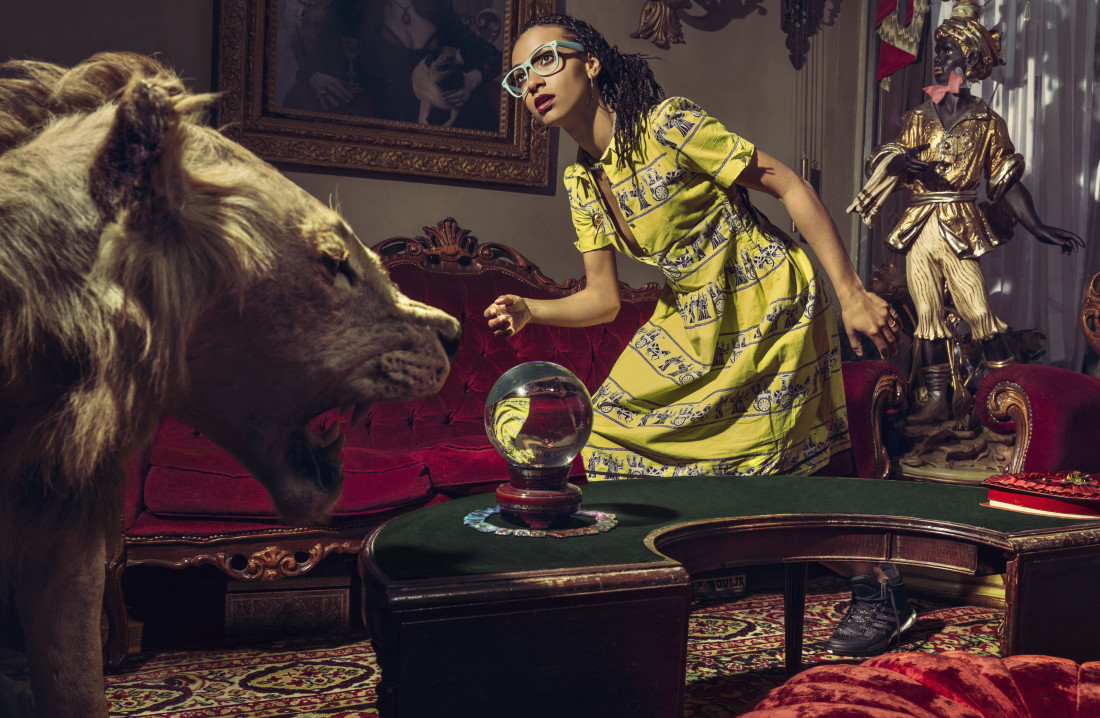Bassist and singer Esperanza Spalding initially made her name as a musical prodigy, then as the youngest member of the faculty at Boston’s Berklee School of Music. She went on to win a Grammy in 2011 (Best New Artist) and made four albums exploring the jazz idiom. But her fifth recording, 2016’s Emily’s D+Evolution, moves well beyond that genre, aided in part by her choice of co-producer. Spalding plays The Orange Peel on Thursday, Oct. 20.
In the music business, Tony Visconti is something of a household name. Since his start in 1968, Visconti has produced more than 120 albums for a wide variety of artists, including more than a dozen for David Bowie. He’s worked in a variety of musical genres, but is most closely associated with rock, and a large percentage of his production duties has been on albums by British artists. Spalding, on the other hand, is described by some as a bass-wielding cross between Joni Mitchell and Michael Jackson. So what led Spalding to choose Visconti to co-produce the sessions that would become Emily’s D+Evolution‘s heady mix of rock/funk/soul/jazz/hip-hop?
Spalding had, in fact, already recorded much of Emily’s D+Evolution before deciding to work with a co-producer. “I didn’t know if this record was valid or if it was any good to anybody other than me,” Spalding says. She knew she didn’t want to work with someone intent on making her music “sound like a jazz record.”
Spalding was especially impressed with Visconti’s production work on Bowie’s 2013 release, The Next Day. “It has a lot of acoustic instrumentation, and yet it still sounds like you’re getting slapped in the face,” she says. “And I wanted that sound.”
Visconti is “a unique character in that he knows so much,” explains Spalding. “He’s been through the whole arc of rock ‘n’ roll and jazz. And he has a classical background. He can arrange for orchestra.” That background, Spalding believes, meant that Visconti would be a good person to “endorse” — that’s her word — the music she had been writing and recording. “I thought, ‘If someone like Tony Visconti understands this record, then I’m good.’ And he did.”
The bassist-vocalist-composer characterizes Visconti’s approach to the Emily’s D+Evolution project as “hands off in all the right ways,” but notes that Visconti was “hands in” concerning studio matters in which his mastery is well-established. An earlier “technical snafu” meant that nearly half of the tracks cut before Visconti came on board would have to be re-recorded, but Spalding is grateful for what might have seemed like a serious setback. “His spirit did need to be in this,” she believes. “And it would have sucked if all the songs that he worked on weren’t on the record.”
Though she initially needed — and earned — that coveted endorsement of Emily’s D+Evolution, Spalding has moved forward from that place. “Now I know better. Because I’m older, I know that you don’t need authorization. But for a while, it was that emotional or spiritual development, artistic development that I needed: an endorsement to feel confident enough to release this to the world.”
Spalding’s first album, 2006’s Junjo, was a straight-ahead jazz release that received positive reviews but didn’t chart. But by the time of her fourth record, 2012’s Radio Music Society, the bassist was selling over 100,000 copies, topping the jazz charts and enjoying crossover success. The small label to which she was signed was absorbed into the larger Concord Records, but when her contract was up for renewal, she didn’t jump ship.
“I like them,” she says of the Concord staff. “They really are champions of me exploring, which is not something that most record labels want to invest in.” She acknowledges that she doesn’t sell as many records as bigger-name artists, “but they still treat me like I do … and that’s really priceless. Any person in a record contract will understand how profoundly special that is.”
Meanwhile, Emily’s D+Evolution isn’t just an album. It’s the basis for Spalding’s live show. She describes the pre-Visconti sessions: “We were going to bring in an audience; they were going to watch us from the control room.” The songs — delivered in a specific order — would tell a story. “We would hit ‘record,’ and we would play the record from the top to the bottom. And that would be the album.” Even though the sessions didn’t ultimately work out that way, that linear storytelling approach informs the live presentation of the material.
“The record is one aspect of the project,” Spalding says. “But the bigger aspect of the project, I would say, is the performance, the staging and the storytelling that is done through dramaturgy. That, for me, is the meat of the project.”
WHO: Esperanza Spalding presents Emily’s D+Evolution
WHERE: The Orange Peel, 101 Biltmore Ave., theorangepeel.net
WHEN: Thursday, Oct. 20, 8 p.m. $27




Before you comment
The comments section is here to provide a platform for civil dialogue on the issues we face together as a local community. Xpress is committed to offering this platform for all voices, but when the tone of the discussion gets nasty or strays off topic, we believe many people choose not to participate. Xpress editors are determined to moderate comments to ensure a constructive interchange is maintained. All comments judged not to be in keeping with the spirit of civil discourse will be removed and repeat violators will be banned. See here for our terms of service. Thank you for being part of this effort to promote respectful discussion.